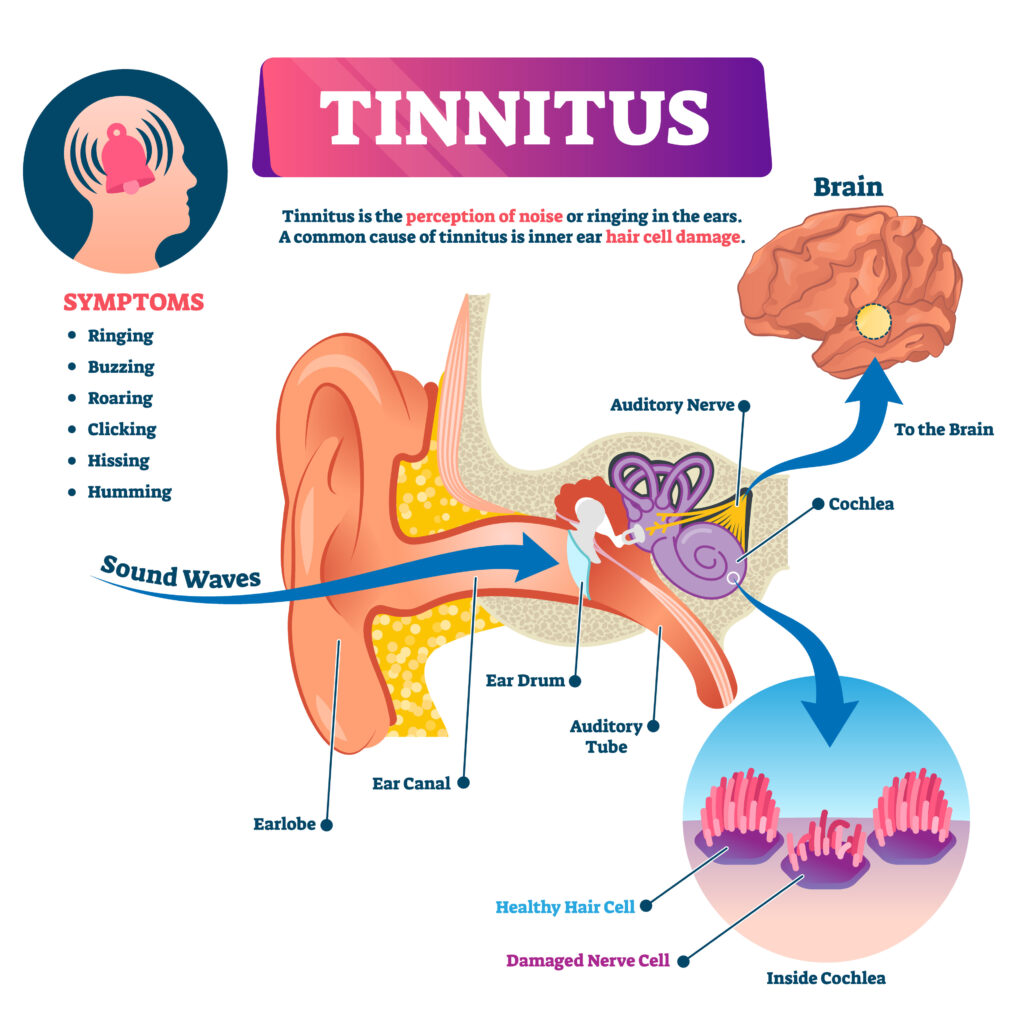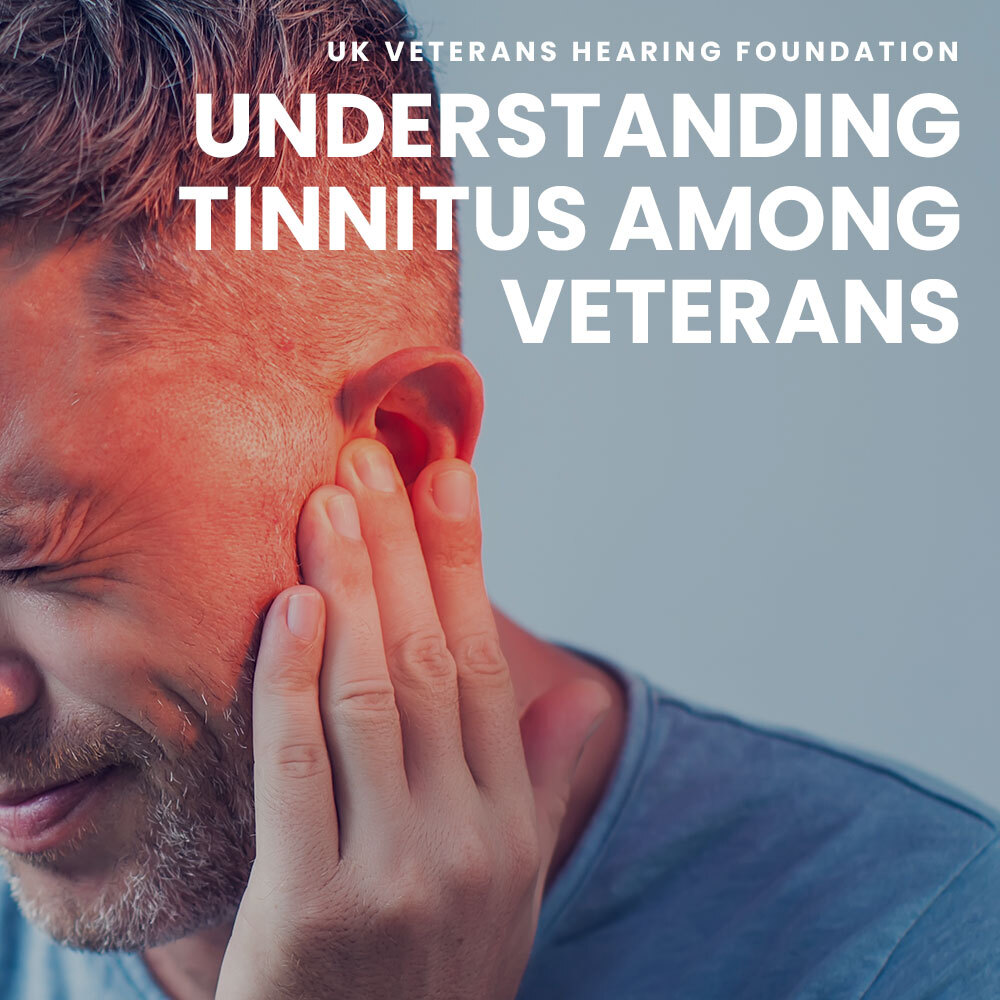The UK Veterans Hearing Foundation has long stood as an advocate for our veterans in the hardships they face, particularly in their battles that are less visible but no less challenging. One such battle is with tinnitus, a condition that affects up to 30% of service people and is the most common service-connected disability for Veterans. In this blog post, we delve into the realities of tinnitus, exploring its causes, impacts, and the solutions we offer.
What Is Tinnitus?
Tinnitus manifests as a ringing, buzzing, or whistling sound in the ears, not caused by external noises. It varies in pitch and volume, often fluctuating in intensity, and can be either a subtle background noise or loud enough to overpower external sounds.
This condition is notably common among UK Veterans, stemming from their exposure to intense and abrupt noises like gunfire and explosions during service. These extreme sound levels can cause lasting damage to the auditory system, leading to tinnitus. It’s a symptom rather than a disease, reflecting various underlying causes. Importantly, while there is no cure for tinnitus, with adequate support and management strategies, significant improvements in quality of life can be achieved.
Tinnitus is more than just a hearing issue. It’s a complex condition that requires a comprehensive approach to care and support, especially within the veterans’ community.
Causes of Tinnitus in Veterans
The primary cause of tinnitus among UK Veterans is exposure to loud noises, a common occurrence in military environments. This includes consistent exposure to gunfire, aircraft engines, explosions, and heavy machinery. Often, these intense noise levels occur without sufficient hearing protection, which can directly damage the inner ear’s delicate structures, such as the hair cells that help transmit sounds to the brain. When these cells are damaged or destroyed, it can lead to the persistent and often distressing symptom of tinnitus.
In addition to noise-induced hearing damage, Veterans can experience tinnitus due to other service-related factors:
- Head injuries, common in combat or training environments, can impact auditory pathways and lead to tinnitus.
- Stress, which is a significant factor in military life, can exacerbate the perception of tinnitus or even trigger its onset.
- Certain medications used during or after service, particularly those that are ototoxic, can also contribute to the development of tinnitus. Ototoxic drugs can damage the inner ear, disrupting normal hearing and balance, and resulting in tinnitus symptoms.
It’s also important to note that tinnitus can be a multifactorial condition for Veterans, where a combination of these factors plays a role. The unique experiences and exposures of Veterans make them particularly susceptible to this condition, highlighting the need for funding, tailored support and understanding in their care.

The Impact on Daily Life and Mental Health
Tinnitus is not just a physical annoyance; its impact on a Veteran’s daily life and mental health can be profound and far-reaching. The constant presence of tinnitus sounds can lead to significant difficulty in concentrating, affecting performance at work and daily activities. Many UK Veterans report that tinnitus disrupts their sleep, leading to insomnia or fragmented sleep patterns. This lack of restful sleep not only exacerbates the tinnitus but also impacts overall health and well-being.
The frustration of dealing with a constant and uncontrollable noise can be overwhelming. This frustration often extends into social settings, where difficulty in hearing conversations over the tinnitus noise can lead to social withdrawal and isolation. The strain of coping with these challenges day in and day out can significantly diminish a Veteran’s quality of life.
Furthermore, tinnitus is frequently linked with mental health challenges. Veterans with tinnitus may experience heightened levels of anxiety, as the persistent noise can create a constant state of heightened alertness or stress. Depression is also common, stemming from the chronic nature of tinnitus and its intrusive impact on daily life. In some cases, tinnitus can be a trigger for PTSD, especially if the sound is reminiscent of noises experienced during military service. The interplay between tinnitus and mental health issues underlines the need for a holistic approach to treatment and support, addressing not only the physical symptoms but also the psychological and emotional challenges it poses.

A Recent Success Story
We recently had the privilege of assisting a veteran who suffered from both hearing loss and tinnitus. By fitting them with top-range hearing aids and providing access to the Sound Relief App and Pillow, we’ve seen a remarkable improvement in their condition. This integrated approach not only improved their hearing but also alleviated the distressing symptoms of tinnitus. Click here to read more about this story.
Our Approach to Tinnitus Management
At the UK Veterans Hearing Foundation, we embrace a holistic approach to tinnitus management, tailored to each veteran’s unique needs. Our strategy includes:
- Advanced Hearing Aids
We provide state-of-the-art hearing aids, many of which have tinnitus-alleviating features. These devices use innovative technologies to mask tinnitus sounds, significantly improving both hearing and tinnitus management.
- Sound Therapy
Tools like the Sound Relief App and Pillow offer soothing sounds to mask tinnitus noise, creating a calming environment and providing relief.
- Counselling and Support
Understanding tinnitus and learning coping strategies are essential. In instances where necessary, we also extend assistance and guidance towards addressing the challenges of mental health concerns. Our Buddy Scheme, for example, is an initiative by us that relies on volunteers and pairs them with Veterans needing a chat or support.
- Partnership with The Hearing Coach
To enhance our support, we collaborate with The Hearing Coach, specialists in tinnitus management. This partnership allows us to offer more targeted strategies and expert guidance. Learn more about The Hearing Coach here.
Our dynamic approach combines the latest in technology with therapeutic techniques and one-to-one support, aiming to lessen the impact of tinnitus and improve our veterans’ quality of life.
Conclusion
Tinnitus may be an invisible battle, but its effects are profoundly real for many Veterans. Through our comprehensive support and dedicated services, we aim to alleviate the burden of tinnitus, helping veterans lead more comfortable and fulfilling lives. If you or a Veteran you know is struggling with tinnitus, reach out to us at the UK Veterans Hearing Foundation. Together, we can navigate this challenge and find a path to better hearing and wellbeing.


Recent Comments